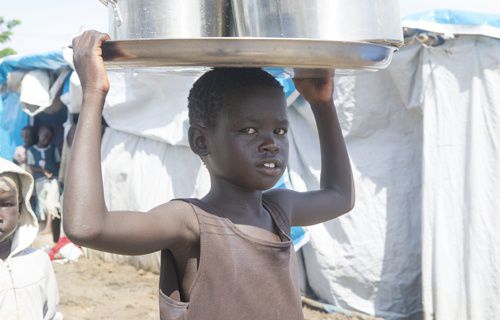The bishops in South Sudan are calling for an immediate end to violence in their country, saying it should be replaced with “dialogue and compromise.” As chair of the U.S. bishops' international justice and peace committee, Bishop Richard Pates of Des Moines wrote to Donald Booth, U.S. Special Envoy for Sudan and South Sudan, on behalf of the South Sudanese bishops on Oct. 22. The South Sudanese bishops "call on their political leaders to stop the fighting immediately and replace it with dialogue and compromise, and urge their leaders to trust their people and give them the chance to determine their own future with the help of traditional leaders, faith communities and civil society actors,” Bishop Pates said. Bishop Pates also thanked Booth for meeting with him in person last month to discuss these issues, calling their session “informative and productive” and urged him to continue putting pressure on both the South Sudanese government and the opposition to end the fighting. He noted that the South Sudanese bishops “do not offer specific political solutions to the national crisis, but they do offer guidance” as well-respected citizens of their country. Continued support from the Intergovernmental Authority on Development — a group of African nations assisting in peace negotiation — and emergency aid from the international community continue to be necessary to “prevent a backward slide into greater poverty” especially as the country enters the dry season when fighting is likely to ramp up. “The bishops are forthright in their condemnation of all parties and individuals who persist in prosecuting the war at the cost of thousands of deaths and hundreds of thousands of people forced from their homes,” Bishop Pates wrote. South Sudan became an independent country in 2011, breaking from the Republic of Sudan eight years after the 2005 conclusion of a 20-year-long civil war. Violence in the new country broke out in mid-December 2013, intensifying a power struggle between forces loyal to president Salva Kiir and those allied behind former vice president Riek Machar. Violence has continued in the country despite a peace accord signed May 9, 2014. Thousands of people have been killed and 1.4 million have been displaced by the violence. Almost 5 million people are in severe need of humanitarian assistance, The Independent reports. The UN estimates that there are some 11,000 child soldiers serving in both the government and rebel armies. Last March, Pope Francis wrote to Archbishop Paulino Lukudu Loro of Juba, encouraging him and all parties involved in the conflict to “tirelessly seek peaceful solutions, enabling the common good to prevail over personal interests.”

